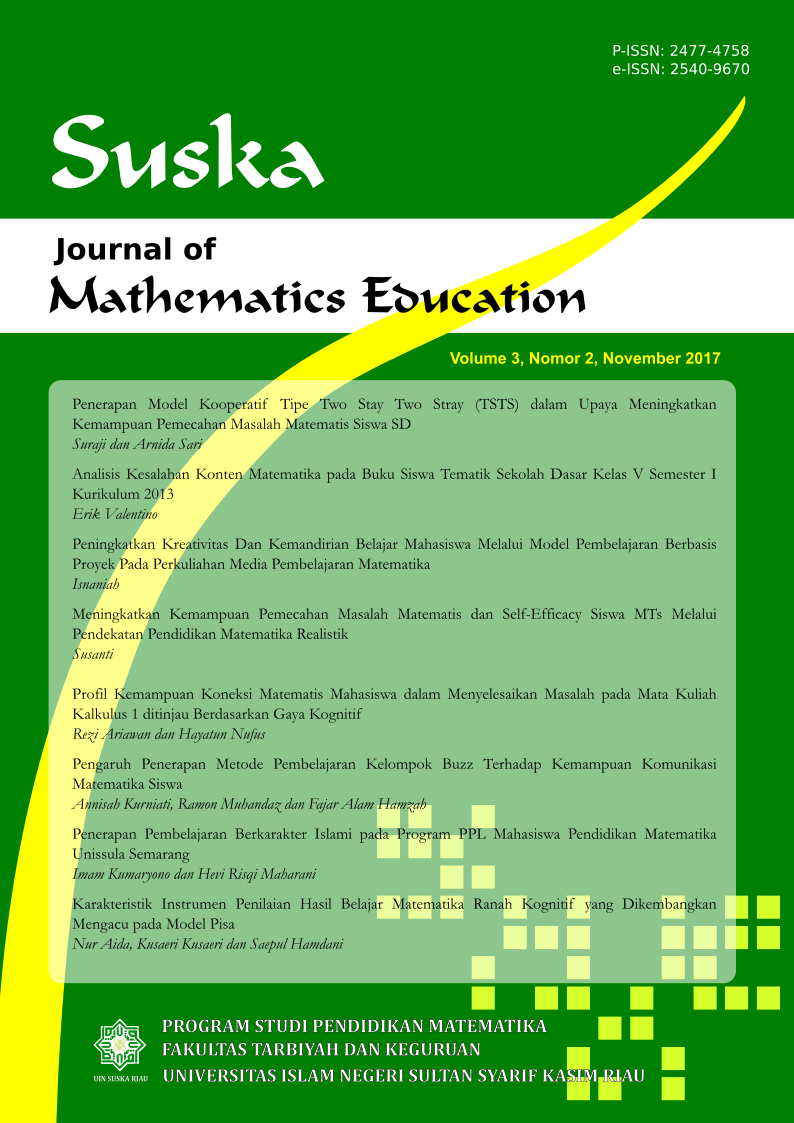Metacognitive Profile of Students Who Play Chess in Solving Mathematics Problems
Abstract
Mathematics is the study of patterns, so in chess pattern recognition is very important in problem solving. Chess is a problem-solving instrument and the best way to analyze problem-solving because chess has clear rules in decision making, thus a skilled chess player becomes a good problem solver. Metacognitive activity and problem-solving processes are intimately intertwined. The purpose of this research is to describe the metacognition profiles of students who play chess and students who do not play chess in solving mathematical problems. This research is a qualitative-research. The research subjects in this study were students who could play chess and students who could not play chess. The criteria are students who have participated in chess matches as low as possible at the sub-district level and regularly play chess, while students who cannot play chess are students who do not understand the basics of playing chess. This research carried out in class VIII at a junior high school in Surabaya. The instruments in this study were math ability tests, problem-solving tests and interview guidelines. The data collection procedure was carried out by giving students a math problem-solving test and interviews. The data analysis technique in this study was carried out in the following steps; transcribing the subject's answers, examining the subject's answer data from interviews, data reduction, data categories, analyzing students' metacognition profiles, and drawing conclusions. The results of the study stated that the metacognitive abilities in solving problems of chess students were better than those of non-chess students. The ES subject achieved 80% of metacognitive activity indicators, while the MI subject only achieved 54.25% of metacognitive activity indicators.
Full Text:
PDFReferences
Aciego, R., García, L., & Betancort, M. (2012). The Benefits of Chess for The Intellectual and Social-Emotional Enrichment in Schoolchildren. The Spanish Journal of Psychology, 15(2), 551–559. https://doi.org/10.5209/rev_SJOP.2012.v15.n2.38866
Artzt, A. F., & Armour-Thomas, E. (1992). Development of a Cognitive-Metacognitive Framework for Protocol Analysis of Mathematical Problem Solving in Small Groups. Cognition and Instruction, 9(2), 137–175. https://doi.org/10.1207/S1532690XCI0902_3
Atashafrouz, A. (2019). The Effectiveness of Chess on Problem-Solving, Working Memory, and Concentration of Male High School Students. ranian Evolutionary and Educational Psychology Journal, 1(4), 249–258. https://doi.org/10.29252/ieepj.1.4.2
Burján, A. (2016). The Effects of Chess Eucation on Mathematical Problem Solving Performance. Teaching Mathematics and Computer Science, 14(2), 153–168. https://doi.org/10.5485/TMCS.2016.0421
Cohors-Fresenborg, E., & Kaune, C. (2007). Modelling Classroom Discussions and Categorising Discursive and Metacognitive Activities. Proceedings of CERME, 1180–1189.
Desoete, A., Roeyers, H., & De Clercq, A. (2003). Can Offline Metacognition Enhance Mathematical Problem Solving? Journal of Educational Psychology, 95(1), 188–200. https://doi.org/10.1037/0022-0663.95.1.188
Ferguson, R. (1995). Chess in Education: Research Summary. A Wise Move’ Conference.
Ferreira, D., & Palhares, P. (2008a). Chess and Problem Solving Involving Patterns. The Mathematics Enthusiast, 5(2), 249–256. https://doi.org/10.54870/1551-3440.1105
Ferreira, D., & Palhares, P. (2008b). Let us know how access to this document benefits you . Chess and problem solving involving patterns. 5(2).
Goos, M., Galbraith, P., Renshaw, P., & Geiger, V. (2000). Reshaping Teacher and Student Roles in technology-Enriched Classrooms. Mathematics Education Research Journal, 12(3), 303–320. https://doi.org/10.1007/BF03217091
Johnson, D. A., & Rising, G. R. (1972). Guidelines for Teaching Mathematics. Wadsworth Publishing Company.
Kazemi, F. (2022). The Effect of Chess Instruction on Mathematics Motivational Strategies for Learning and Error Model of Students’ Problem Solving Based on Newman Model. Journal of Algebraic Statistics, 13(2), 2698–2716.
Kazemi, Farhad, Yektayar, M., & Abad, A. M. B. (2012). Investigation The Impact of Chess Play on Developing Meta-Cognitive Ability and Math Problem-Solving Power of Students at Different Levels of Education. Procedia - Social and Behavioral Sciences, 32(Iccs 2011), 372–379. https://doi.org/10.1016/j.sbspro.2012.01.056
Kramarski, B., & Mevarech, Z. (2003). Enhancing Mathematical Reasoning in The Classroom: The Effects of Cooperative Learning and Metacognitive Taining. American Educational Research Journal, 40(1), 281–310. https://doi.org/10.3102/00028312040001281
Lester, F. (1994). Musings About Mathematical Problem-Solving Research: 1970-1994. National Council of Teachers of Mathematics, 25(6), 660–675. https://doi.org/10.2307/749578
Liptrap, J. M. (1998). Chess and standard test scores. Chess Life, 14.
Mel, B. (2021). Does playing chess improve mathematics scores? An experimental study among co-curricular chess students in Politeknic Kuching Sarawak. International Journal of Advanced Research in Education and Society, 13(2), 9–17.
Meloni, C, & Fanari, R. (2019). Chess Training Effect on Meta-Cognitive Processes and Academic Performance. Eric, 387–393. https://doi.org/10.33965/celda2019_201911L048
Meloni, Carla, & Fanari, R. (2019). Chess Training Effect on Meta-Cognitive. 16th International Conference on Cognition and Exploratory Learning in Digital Age, (Celda), 387–393. https://doi.org/10.33965/celda2019
NCTM. (2000). National Council of Teachers of Mathematics.(2000). Principles and standards for school mathematics. Reston, VA: National Council of Teachers of Mathematics.
Piaget, J. (1970). Piaget’s theory (Vol. 1). Wiley New York.
Pierson, J. L. (2008). The Relationship Between Patterns of Classroom Discourse and Mathematics Learning. The University of Texas at Austin.
Polya, G. (2014). How to Solve It: A New Aspect of Mathematical Method. Princeton University Press.
Rezvani, M. A., & Fadaee, M. R. (2014). Effect of Chess Training on Math Problem-Solving Ability of Elementary School Students. 4(5), 240–244.
Rott, B. (2013). Process Regulation in The Problem-Solving Processes of Fifth Graders. Center for Educational Policy Studies Journal, 3(4), 25–39. https://doi.org/10.15488/1849
Sala, G., Gorini, A., & Pravettoni, G. (2015). Mathematical Problem-Solving Abilities and Chess: An Experimental Study on Young Pupils. Sage Journals, 5(3), 1–9. https://doi.org/10.1177/2158244015596050
Tachie, S. A., & Ramathe, J. (2022). Metacognition Application: The Use of Chess as a Strategy to Improve the Teaching and Learning of Mathematics. Education Research International, 1–13. https://doi.org/10.1155/2022/6257414
Thompson, M. (2003). Does The Playing of Chess Lead to Improved Scholastic Achievement? Issues In Educational Research, 13(2), 13–26. Diambil dari http://www.iier.org.au/iier13/thompson.html
Trinchero, R., & Sala, G. (2016). Chess Training and Mathematical Problem-Solving: The Role of Teaching Heuristics in Transfer of Learning. Eurasia Journal of Mathematics, Science and Technology Education, 12(3), 655–668. https://doi.org/10.12973/eurasia.2016.1255a
Veenman, M. V. J., Van Hout-Wolters, B. H. A. M., & Afflerbach, P. (2006). Metacognition and Learning: Conceptual and Methodological Considerations. Metacognition and Learning, 1(1), 3–14. https://doi.org/10.1007/S11409-006-6893-0
DOI: http://dx.doi.org/10.24014/juring.v6i3.24721
Refbacks
- There are currently no refbacks.
Juring (Journal for Research in Mathematics Learning)
Universitas Islam Negeri Sultan Syarif Kasim Riau
Indexed by:














